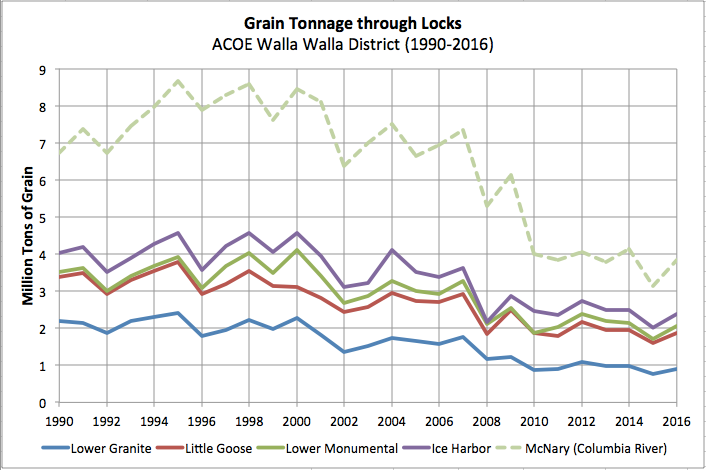forum
library
tutorial
contact

Asian Wheat Purchases Return to Normal
Mateusz PerkowskiCapital Press, September 5, 2013
|
the film forum library tutorial contact |

|
Asian Wheat Purchases Return to Normal
Mateusz PerkowskiCapital Press, September 5, 2013 |
Wheat exports from the Northwest are proceeding smoothly despite an ongoing investigation by the USDA into the origin of an unauthorized release of biotech wheat in Oregon. The long-term effects of the release on the commercialization of biotech wheat remain unknown, an industry group says.
 Shipments of wheat to Japan and South Korea are at normal levels after resuming roughly a month ago, according to an industry association.
Shipments of wheat to Japan and South Korea are at normal levels after resuming roughly a month ago, according to an industry association.
The two countries halted exports in late May after an unauthorized release of biotech wheat was discovered in Oregon.
Investigators from USDA still haven't disclosed how the restricted crop may have ended up the the field, but the genetically-engineered trait hasn't been detected in any shipments of wheat, said Steve Mercer, vice president of communications for U.S. Wheat Associates.
"The longer the testing happens and we have no indication of a problem, it's good news for the market," Mercer said. "I don't think I'd characterize it as blown over. It's part of what we do now."
Officials in Japan and South Korea -- major destinations for Northwest soft white wheat -- have been running genetic tests on incoming wheat shipments to test for the glyphosate-resistant trait, developed by the Monsanto Co.
The USDA's Animal and Plant Health Inspection Service, which regulates biotech crops, hasn't laid out how long its investigation into the unauthorized release might take, Mercer said.
The only frame of reference is a similar investigation into an unauthorized release of genetically-engineered rice in 2006, which concluded after roughly a year but did not identify how the escape occurred, he said.
The Monsanto Co. has said that it tested tens of thousands of wheat samples from the Northwest and not detected the biotech trait in any of them.
The company has also raised the possibility that opponents of genetic engineering purposefully sowed biotech seeds in the Oregon field to create a market disruption.
Despite the uncertainty, there hasn't seemed to be any negative consumer reaction in Japan and South Korea since exports resumed, said Mercer.
"I think the position of the government means a lot to the consumers there," he said.
The Center for Food Safety, a non-profit group that has litigated against USDA over biotechnology, wants the agency to strengthen its oversight of restricted genetically engineered crops.
"Given the laxity of the field trial system, it's difficult to trace these episodes back," said Bill Freese, science policy analyst for the group.
Under USDA rules for field trials, biotech developers are responsible for setting and following their own protocols for preventing an unauthorized release.
While the agency should be strengthening its oversight after the biotech wheat release, APHIS has a backlog of investigations that is preventing it from examining cases thoroughly, Freese said.
The episode has likely been a setback for commercializing biotech wheat, as it highlights how opposed foreign markets are to the crop, he said. "People don't want genetically engineered wheat and many farmers don't either."
Related Pages:
Idaho Ag Exports on Track to Set a New Record by Sean Ellis, Capital Press, September 2, 2013
Shipping Wheat: Truck or Barge? by Ken Casavant, Transportation Characteristics of Wheat & Barley Shipments
on Haul Roads to and from Elevators in Eastern Washington, March 1995
learn more on topics covered in the film
see the video
read the script
learn the songs
discussion forum
